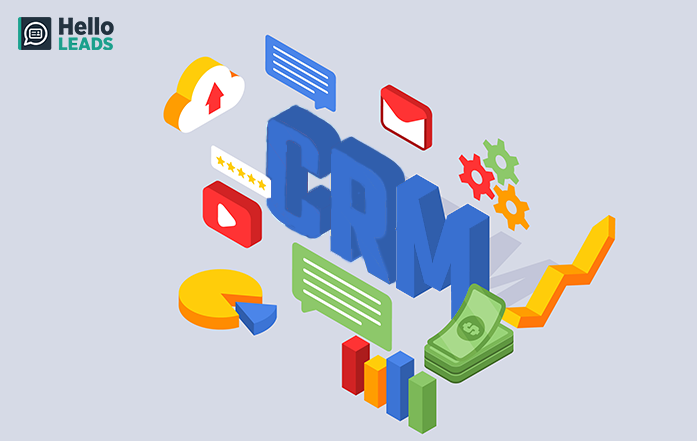
Customer Relationship Management (CRM) software is a tool that helps businesses to develop strong customer relationships. CRMs help in managing customer and lead records in one central repository, helps in tracking leads, following up, managing and analyzing sales, and taking care of customer support – all under one roof. CRM software often boosts sales for a business by strengthening client relations. Right now, the biggest software market is CRM software. This makes perfect sense as businesses are competing to win customers. There are many CRM options available. So, you need to know how to pick one that precisely suits your company’s demands. We can categorize them broadly into three types: Operational, Analytical, and collaborative.
1. Operational CRMs
Operational CRM, as the name implies, eases and facilitates your business operations. It is an important tool for lead generation, support and lead management. They automate the processes involved in lead generation, lead tracking, and sales conversions. They are used both in sales and customer support. The typical core features of an operational CRM include marketing automation, sales automation and service automation.
i) Marketing Automation

CRMs can automate tedious marketing activities like bulk email campaigns and their follow-up, reaching out to contacts and social media integrations.
A CRM tool’s email marketing functionality, in particular, enables you to communicate with potential clients by creating customized and pertinent emails. It allows you to stay connected with the customers. It also allows you to build relationships with prospects and nurtures a strong relationship with existing customers.
Operational CRMs can also deliver marketing analytics which helps in improving marketing campaign efficiency through centralized lead management and follow-up.
Your business operations will be improved by having all the information in one tool. The likelihood of “losing” a deal or miscommunication between teams is also reduced.
ii) Sales Automation
Scaling up sales needs a lot of energy, enthusiasm, and efforts. It needs a good tool as well. Having a good CRM can be a boon and can free up time for you to continue to focus on your customers and sales.
The process of streamlining manual and repetitive processes in the sales process is known as sales automation. A typical sales automation process includes email scheduling for leads, tracking and analyzing sales calls, sales forecasting, etc.
CRM can be of great help in case your sales team needs to: (i) generate an instant sales report, (ii) keep track of your sales team’s daily activity, (iii) access and manage all leads and customers. A CRM assists in defining the roles and responsibilities of each member of your sales team, allowing you to assess how your sales reps are allocating their time and what actions are required to support them in securing more business.
Growth of small business in particular, largely relays on the customer follow up activity usually done by the sales team. Hence, the CRM is useful as it helps in tracking all activities taken on a lead including calls, call duration, messages, emails and in-person visits.
CRM thus helps the sales employees to perform daily tasks better and the sales leadership team to make more accurate business decisions. Additionally, it aids in monitoring statistics like profitability, customer retention rate, and marketing campaign performance. Actionable reports and dashboards on sales and team performance provide a high-level view of how a business is coping up with different metrics. This feature also lets you share reports with different teams in your organization to make collaborative data-driven decisions.
Therefore, an operational CRM helps sales teams in improving conversion rates by providing deeper insights on prospects, driving rapid lead response, and improving selling discipline.
iii) Service Automation
A CRM in itself is a customer service software that helps you enhance and automate the customer service by significantly reducing human labor when serving clients to improve customer satisfaction and thereby building stronger and long-lasting customer relationships.
Modern CRM systems incorporate help desk tools, and provides integration features with interactive voice response (IVR) systems for automating customer service.
2) Analytical CRM
Analytical CRMs performs data gathering and are primarily used to analyze the customer data to help you make better business decisions and in turn improves customer satisfaction. These are databases with detailed information about customers which processes and provides different views and analyses of lead and customer information.
Particularly, analytical CRM gathers and organizes sales, marketing, and customer service data in a way that facilitates insight discovery (i.e., leveraging the data collected for customized and targeted marketing campaigns, better sales efforts, and for providing personalized customer support) and presents thorough reports which you can use to make tactical business decisions. It also integrates invoice software so you can generate reports based on the cash flow of your company.
The most critical components of an analytical CRM are data mining, data warehousing and attribution.
a) Data Mining:
Analytical CRMs inculcate data mining techniques to monitor information and data patterns related to client interests. This CRM gives clients comprehensive information thanks to a better understanding of the customer lifecycle, a process that entails customer identification, acquisition, retention, and development.
b) Data Warehousing:

The CRM acts like a data storehouse that stores current and historical data in a centralized location. Additionally, the CRM arranges the stored data such that it may be quickly accessed, analyzed, and can be used to generate reports. This may contain information about your clients, your company dealings, or even the productivity and performance of your employees.
c) Attribution:
CRMs with analytical capabilities assist you in determining which touchpoints resulted in a customer. This enables you to identify the sources of your top clients and learn how to market more effectively to them.
Touchpoints are any social interactions a potential consumer has with your company, such as viewing or clicking on an advertisement, visiting your website, etc.
3) Collaborative CRM
“Always a team approach to sales is great as everyone can contribute to winning a customer”
Collaborative CRMs, also known as strategic CRM, help in breaking barriers by sharing customer information with your sales team and also finding new ways to enhance sales and business strategies.
This CRM focuses more on customer satisfaction, customer service, and customer retention than on customer acquisition.
Collaboration management and channel management are the two key elements of a collaborative CRM.
i) Interaction management

It tracks and monitors every interaction between a business and its customers — whether through email, phone calls, messages, social media, in-person interactions, or other communication channels.
Interaction management lets your organization to keep a log of this kind of communication and make notes about it. Then, different business units can share this information throughout the company.
ii) Channel management
Channel management takes interaction management a step further. It is the process of identifying and ultimately pursuing the communication channels that best suit client preferences utilizing the data obtained and analyzed during interaction management.
The bottom line is that, while each type of CRM has its own benefits, it is vital to identify the one that best meets your business requirements. If you want to automate and streamline your sales, marketing, and customer service, an operational CRM would be beneficial. On the other hand, in case your business needs performance metrics and dashboard analytics to devise sales forecasts and make data-driven decisions, opt for an analytical CRM. And if you want to make business synchronicity and collaboration your main priorities, collaboration CRM can be your way to go.
Share this blog :














Leave a Reply